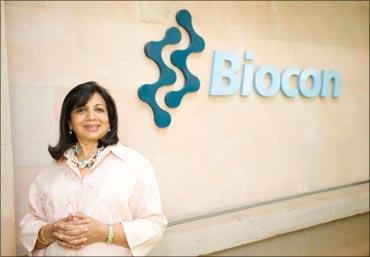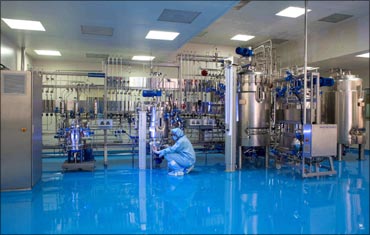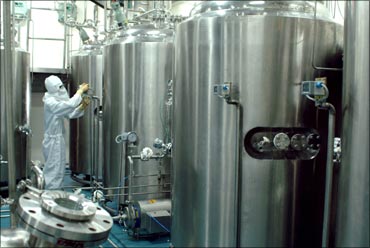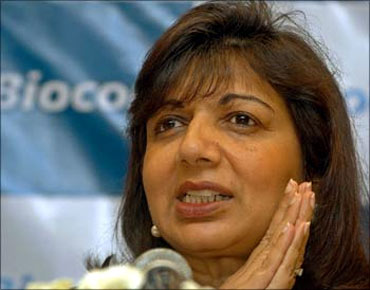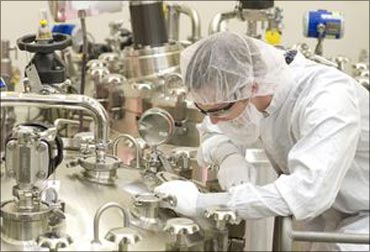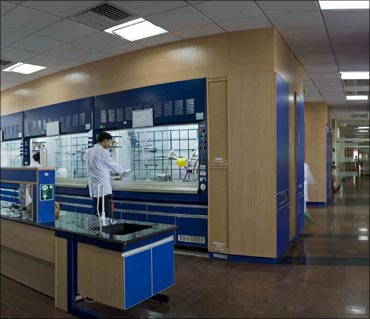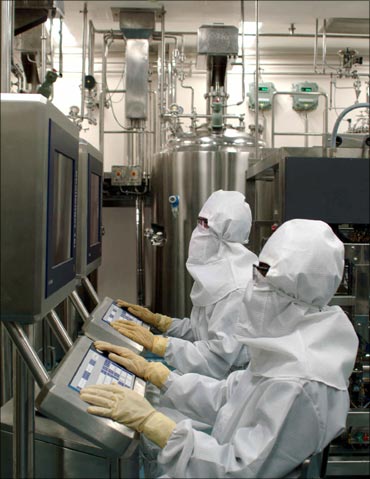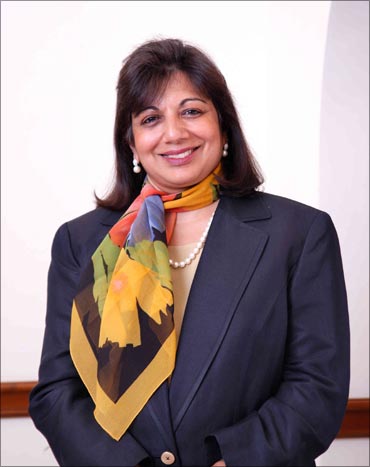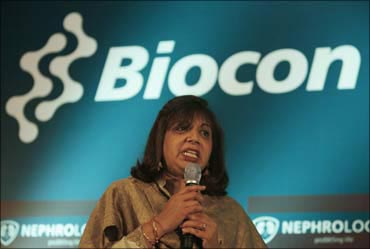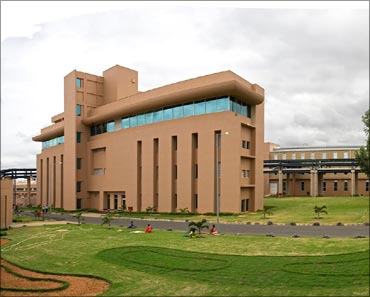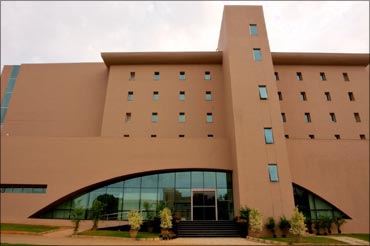 | « Back to article | Print this article |
Kiran Mazumdar-Shaw on innovation, entrepreneurship
The story of Kiran Mazumdar-Shaw is one of grit, self confidence and courage. If today she is one of the most successful entrepreneurs in the world, it is because of her determination.
She started Biocon in 1978 to manufacture enzymes because she didn't get a job as a brewer after getting herself trained in Australia. That was the time nobody was even talking about biotechnology.
Later, she also established two subsidiaries: Syngene (1994) to provide development support services for discovery research; and Clinigene (2000) to cater to clinical development services.
Today, her achievements are unparalleled. She has been awarded the Padma Shri in 1989 and the Padma Bhushan in 2005 by the Government of India.
She was recently named among Time magazine's 100 most influential people in the world. She is also on the Forbes list of the world's 100 most powerful women. The Financial Times listed her in the top 50 women in the world.
In this exclusive interview with Rediff.com at the Biocon Corporate Office in Bengaluru, Kiran Mazumdar-Shaw speaks about her journey as an entrepreneur and also many current issues including the one she is most passionate about, healthcare.
Click NEXT to read on . . .
Kiran Mazumdar-Shaw on innovation, entrepreneurship
Have you at any point in your journey of 33 years, looked back on the day you started Biocon in a rented garage with a capital of Rs 10,000?
It is always nice to reflect on how one started. It is only then one gets the perspective of how big the organisation is today.
It is a very nostalgic feeling because it makes you realise that there are such enormous possibilities to get started.
I think when you look at how it started and how the organisation is today, you feel wonderful. This is something one never imagined possible.
That is what the journey has been about; about entrepreneurs taking small steps.
With big dreams?
Yes, every entrepreneur wants to succeed and has a big dream. Initially you never think about the big dream. You just want to survive and make sure that your business stays afloat.
Once you start succeeding, you start dreaming big. For me, it was that way. I only had a small dream.
Click NEXT to read on . . .
Kiran Mazumdar-Shaw on innovation, entrepreneurship
What was the small dream you had?
My small dream when I started was about starting a biotech company which was a pioneering concept. It was about running an R&D based business.
I was excited about that as a scientist. I didn't know what was in store because I had nothing to benchmark myself against. When you are a pioneer, you don't know how big it can grow.
So, when you start off, your dreams are very small. It is like, 'let me start a new sector based on biotech and R&D and see how big I can make this business'. That is the way it started off, as a small dream.
This dream was because of a rebound. I had actually wanted to take up a career and a job. When I didn't get a job (as a brewer), I was quite happy to run a business that is equivalent to a job.
As I stared building the company, I also started dreaming bigger and bigger. I would say my dream also grew big like the company.
Click NEXT to read on . . .
Kiran Mazumdar-Shaw on innovation, entrepreneurship
Today, biotechnology is the one of the most happening fields, but when you started nobody was even talking about it. So, you were like a visionary...
I don't know whether I can call myself a visionary. I was excited about the whole concept of biotechnology. Nobody even understood what biotechnology was 33 years ago.
Pioneering companies always try out new things and experiment with new concepts and new things.
Where does India stand in the field of biotechnology?
India is beginning to become a very important biotech hub largely because we have a talent pool that can be tapped into. We have always focussed on science and technology.
Biotechnology is a combination of life sciences and engineering. And we have both, not at the high-end skill level, but we have a good skill base in chemical engineering and biochemical engineering.
In India, we focus on manufacturing and process development. Where we are not strong is in discovery and research. That kind of scientific focus has never been there in this country.
Click NEXT to read on . . .
Kiran Mazumdar-Shaw on innovation, entrepreneurship
What could be the reason why India does not focus on R&D?
It is just our educational focus. Our educational orientation is about seeking a job and getting a job in the industry or in the government.
There is no impetus for people to pursue R&D because we haven't had scientific entrepreneurship. If we had scientific entrepreneurship backed with funding, we would have had a spurt of discovery research initiatives. But there is very little happening there.
Industry is not interested in discovery research as they are into generics and imitative technology. So, there is no driving force for innovation and discovery research in the scientific milieu.
Until the government is willing to back a good scientific idea with funding at the concept stage, you will not have the focus on discovery research.
Click NEXT to read on . . .
Kiran Mazumdar-Shaw on innovation, entrepreneurship
You mean we are not anywhere near the developed countries as far as research is concerned?
No, not at all. But we are beginning to see signs of some of this happening in India. Recently I was working with a few scientists in some parts of the country, and I see that they are coming up with novel concepts.
This will flourish only when one succeeds suddenly. Success breeds success.
How was it for you when you decided to focus on R&D? I have read that investors were not willing to back you.
Even today, investors are very sceptical about what Biocon can do. They would rather we only imitate. They have a lot of confidence in our imitative generics and bio-similar strategy.
Every time we say innovation, they take it with a pinch of salt. They don't want to invest in research as they see it as a risky area.
Basically there is a lot of scepticism in this country -- both from the investor community and from the government itself.
Click NEXT to read on . . .
Kiran Mazumdar-Shaw on innovation, entrepreneurship
Should there be more encouragement from the government?
Yes. If there is an ecosystem that supports and rewards innovation, then everyone will want to do it. But if you constantly curb people, and say that there are better things for government to invest in, this is what happens.
Today, the United States government invests huge amounts in scientific innovation and academic centres, and most of the support comes from national bodies like NSF (National Science Foundation), NIH (National Institute of Health), et cetera.
They are the ones investing in early stage innovation. Once the early stage innovation is developed, industry comes in and does the rest.
Look at what China is doing. It has committed $300 billion to life sciences and biotechnology.
But in India we expect industry to do the government's job, which will not happen. Industry will never invest in early stage research. Their job is to take up exciting projects and then commercialise them.
What the government must do is support innovation in academic institutions and encourage scientific entrepreneurship.
Click NEXT to read on . . .
Kiran Mazumdar-Shaw on innovation, entrepreneurship
Why do you think Indian government's focus is not on scientific research?
Let alone scientific research, today India does not even have a national healthcare system.
Eighty per cent Indians today live on less than $3 a day. So, we have a huge burden of poverty on us. Twenty-five per cent live below poverty line which is less than a dollar a day. Sixty-five per cent lack basic access to medicine. So, you can imagine what a huge challenge healthcare is.
Look at our literacy rate. We are the most illiterate, under-nourished and poor nation if you look at the numbers.
You cannot be talking about being a superpower and inclusive development when you have this kind of statistics. That is our biggest challenge.
What I am trying to say is, as a country we need to innovate fast. We need to innovate solutions to these challenges. No other country has these kinds of problems. Where do we have $300 billion to commit? We have only a fraction of that.
We spent the lowest for healthcare, less than 1 per cent of our GDP, which is $47 per capita, as opposed to China's $90 and South Africa's $250. We have to spend at least three times more on healthcare.
Click NEXT to read on . . .
Kiran Mazumdar-Shaw on innovation, entrepreneurship
What about the National Health Service of the UK? The healthcare system is run by the government there
We say, 'let's learn from NHS'. NHS is finding it difficult to cope and bursting at its seams. There, the whole healthcare infrastructure is within the government and it becomes a huge financial burden.
Is that the efficient way or is that an expensive way? That is the question. The government does not have the money to expand the limited NHS infrastructure. Governments shouldn't be healthcare providers.
In India, 90 per cent of the surgeries are done in private sector. And 90 per cent of surgeries are out of pocket. That is why we suggest the other model where the government is the healthcare insurance provider to the common man and the private sector the health provider.
The common man should be supported by the government. Let there be private insurance for those who can afford. I would say we need a tiered insurance system.
Click NEXT to read on . . .
Kiran Mazumdar-Shaw on innovation, entrepreneurship
Your work in R&D is basically in oncology, diabetes and auto-immuno diseases. Did you decide to concentrate on these areas because there was not enough research taking place in these fields in India?
When I started Biocon, it was developing novel enzymes. We were constantly developing novel enzymes to address some of the industrial challenges.
When we transformed our business to bio-pharmaceuticals, we continued with the research culture. We felt in a country like India, and indeed the world over, chronic diseases are increasing but the treatment is very expensive.
While others concentrated on preventive diseases and vaccine, we wanted to look at chronic diseases where the treatment is life-long.
We then decided to look at insulin because it is an expensive drug and a lifelong therapy and we are totally dependant on imports. And, India has a huge diabetic population.
Then I started looking at cancer as it is an expensive disease to treat. Very few people can afford cancer therapy. It is the same thing about auto-immuno diseases too. Most of them do not even have a drug to treat it.
We felt if biotechnology gives us an opportunity to address these problems, let us do it.
Click NEXT to read on . . .
Kiran Mazumdar-Shaw on innovation, entrepreneurship
Are you satisfied with research you are doing and its progress?
We are quite satisfied with the research we are doing. We are getting exciting results too. What we need in our country is more discovery research. I always have to go outside India for novel ideas.
It is the ecosystem that prevents scientists from coming out with novel ideas and not scientists themselves. Money has to be allotted by the government in an egalitarian way.
In what direction does the research of your labs go?
We have a four-bucket way of looking at our research. One, incremental innovation; two, evolutionary innovation and these are building on existing knowledge.
Our insulin portfolio comes under incremental innovation. We have only developed a new technology for insulin. There is much lower risk in this.
Evolutionary innovation is some of the antibodies we are making. We are only making complex antibodies.
We try to invest in the 'experimental innovation' bucket. For instance, we are trying to develop cancer vaccines. Our philosophy is, 'how do you go from cancer care to cancer cure'? We have some ideas like, if we stimulate the immune system to kill cancer cells, maybe that is the most effective way of killing and curing cancer.
We are excited about some data but we will know whether it will work or not in another 4-5 years. If it works, it will be a break through technology.
We invest in early stage experimental innovation and if we are doing something very novel and path breaking, we take big risks there but in small investments.
Oral insulin is a very good example of breakthrough innovation. Nobody in the world has developed oral insulin. Yes, there is a little more work to be done. That is how we look at innovation.
We brought the innovation from a small company from North Carolina that had taken it from a university. We brought it here and started developing. Similarly, the cancer vaccine concept came from John Hopkins University. We funded the scientists there.
Today, 10-12 per cent of our revenue goes to R&D. We are clearly recognised as an R&D driven company.
Click NEXT to read on . . .
Kiran Mazumdar-Shaw on innovation, entrepreneurship
You have worked in the pre-liberalisation and post-liberalisation period. How do you describe the difference?
I would say in the pre-liberalisation period, India was growing slowly. So entrepreneurs also had the luxury of growing very slowly.
Today, it is a very exciting space to be in. Entrepreneurs of today are thinking big and global. There is a lot of investment in India. We are able to grow our businesses faster. Access to capital is much easier now.
From that point of view, it is very different. It is an exciting time.
As a woman entrepreneur, how has it been for you?
Basically, I am in a very different field. I was unique in many ways. I was a woman entrepreneur and a biotech pioneer. I never looked at myself as a woman entrepreneur because I was always painted as a very different breed of entrepreneur.
I had the challenges as a pioneer and I never looked at the challenges as a woman entrepreneur. So as a pioneer, I have been treated very differently. After succeeding, I don't think anyone today sees me as a woman entrepreneur.
Click NEXT to read on . . .
Kiran Mazumdar-Shaw on innovation, entrepreneurship
Why do you think there are not many successful woman entrepreneurs?
We see many women entrepreneurs today when it comes to small businesses. But where we do not see many success stories is in large businesses. I think it stems from lack of self confidence.
Most women feel that they have limitations and they are not cut out to hold such large businesses. That has to change. It is heartening to see family businesses are encouraging their daughters which was not so in the past. That is a good sign.
There are lots of executives but not many taking leadership roles. That is why I feel excited to see women like Mallika Srinivasan (CEO of Tractors and Farm Equipment), who is heading a manufacturing entity.
Yes, we need to see more entrepreneurs handling big businesses.
What would be your advice to young entrepreneurs?
First and foremost, I want to tell them that there are no short-cuts to success. I encourage young entrepreneurs because I feel India can grow only through entrepreneurship. Entrepreneurship is the only job multiplier.
In India, there are so many opportunities for young people to start businesses. It is heartening to see so many new ideas.
Click NEXT to read on . . .
Kiran Mazumdar-Shaw on innovation, entrepreneurship
Do you call entrepreneurship chasing a passion?
It is not just about chasing the passion. It is about creating new opportunities.
Your tag line says, the difference lies in the DNA.
I always say, whatever you do, you must be different because every one of our DNAs is different. So, don't copy somebody else's business model.
I always tell young people to try and do something different and challenge yourself. If you challenge yourself, you can stand apart. Otherwise, you will be one among the many.
You have won many awards including the Padma Shri, the Padma Bhushan, etc. You have been named as one of the top business persons in the world. Which do you think is your biggest achievement?
Every laurel is special. Obviously, the Padma Shri and Padma Bhushan are very important laurels because it is a national recognition. Then, Time magazine naming me as one of the 100 most influential people in the world. It was a big recognition.
I think that every one of them is special in its on way but when you ask me what is my greatest achievement, I would say I still don't think I have achieved enough. I have much greater things to achieve.
I really want to bring an innovative drug to the global market. If my oral insulin or CV6 antibody or the cancer vaccine can be a transformational product, then I feel very, very fulfilled. Then, I would have made a difference to humankind. That will be the legacy I would like to leave.
Click NEXT to read on . . .
Kiran Mazumdar-Shaw on innovation, entrepreneurship
How do you relax?
I get very little time to relax. I relax when my family visits me and we take a short holiday. I love swimming. I like beaches. So, we generally like to go to the Maldives. I also like to go to Europe. Italy, Spain are my favourite countries.
On a weekday, what do you do to remain peaceful and not stressful?
It is impossible. I am always very stressed. I don't think I can ever say I am a peaceful person at work. There are a lot of issues and decisions.
Business is stressful these days. Let us not kid ourselves. I would be lying if I say I can de-stress on a working day.
The only way to de-stress for me is to take one or two days off and then come back. On a Sunday, I can de-stress. Sunday is my day! I don't do anything that is connected to my business. I play with my dogs, I swim, and I have a massage if I can. I see a movie with friends.
But during the week, I am stressed.
